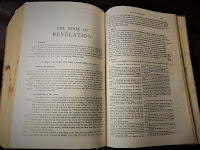Advent 3, Year C Zephaniah 3:14-20
I have been
ordained for 16 years now and it’s taken
me about that long to grow accustomed to the lectionary readings that we read every
Advent. Despite the fact that I had been
going to church every Sunday for my entire life, I remember looking at the
readings assigned for the Sundays during Advent when I was first ordained and
thinking, what in the world is going on here? These don’t make me feel
good. Why is there so much John the
Baptist? We need more feel good stuff,
more joy because this is supposed to be a joyful season. Isn’t that what they say, “It’s the most
wonderful time of the year.” Finally, on
the 3rd Sunday of Advent we get a little joy in the first few
readings. But we are still stuck with
John the Baptist calling us a “brood of vipers.” So I will start with the other readings for
now.
Zephaniah…now
that is an interesting one. The Book of
Zephaniah is only three chapters long.
We know little about the author. Some
believe that Zephaniah was writing and preaching right after the reign of a
horrible king, which explains the first two chapters detailing how awful
everything is. It might be hard to believe based on our reading for today, but
Zephaniah is considered one of the gloomiest parts of the Bible. In fact, the 2nd verse of this
book is, “I will utterly
sweep away everything from the face of the earth, says the Lord.” That is how bad things are. The prophet concluded that God’s only option for
this land and these people was total destruction. Remember, God promised never to do that after
the great flood. Things were so bad,
Zephaniah thought complete destruction was the only option. Just start over again.
The
Book of Zephaniah was written after Israel and Judah split. Israel had been conquered and Judah was on
the cusp of being conquered. Zephaniah
seemed to have little hope. But as is so
often the case in the books of the Bible, something shifts dramatically in the
middle of chapter three. After the
accusations, the judgment and the warnings, suddenly there is joy. “Sing aloud, O daughter Zion; shout, O
Israel! Rejoice and exult with all your heart; O daughter of Jerusalem!”
 |
| Christmas 2020--no inside service, but we still decorated. |
Yet, it
remains a little awkward. We are still wearing
masks and trying to be careful. We are
still in the middle of a pandemic that is supposed to be long over. How can we
truly sing with joy? How can we shout in exultation when shouting is dangerous?
That
is what is so astonishingly appropriate about this reading from Zephaniah. This joy that comes in chapter three is that
much more incredible because it’s not supposed to be there. Why? Because nothing seems to have
changed. Judah was conquered. The Hebrew
people still struggled mightily. But God
decided to show up anyway. God’s
presence broke through the fear, the sadness and even the hate. That is true joy---joy that is grounded in
God’s presence.
It’s
the same in our reading from Philippians.
Paul was writing from prison. He
knew there was a good chance he would be executed. He had every reason to be
sad, angry and anxious. But he was able
to tell the people to rejoice and not to worry.
Why? Because, “The Lord is near.” That is what Paul wrote in his letter to the
Philippians. That is what Zephaniah also
said 100’s of years before, “The Lord is in your midst…” And while John the Baptist is kind of scary
and intimidating, he was saying the same thing in our Gospel today, “God is
coming and that is good news.” That doesn’t mean there won’t be hard times.
That doesn’t mean we don’t have to prepare, repent, try to be better. It means that God is coming no matter what.
Joshua
has been talking a lot about Santa’s list and I confess we have as well. But I finally said, “You know Joshua, I don’t
know what Santa will do. But I can promise you that we will give you presents
no matter what. Because that is what we do as parents. We love our children, no
matter what. That is the kind of love
that God has shown us over and over again over the course of human history. Unrelenting
and completely unreasonable---love.
We
have no idea if the people of Judah ever repented or changed their ways. In the end, it wasn’t about them. It was about God choosing to love them no
matter what. I read a quote in a
commentary that I just loved. It said, “…true repentance bows in helpless
submission in the face of this great forgiveness.”[1]
Sometimes
we have to know what it is to be forgiven before we can find the strength or
courage to ask for that forgiveness, or even know that we need it. Sometimes we have to experience utter
desolation to understand joy. And sometimes, our voices have to be silenced to
know what it truly means to sing.





